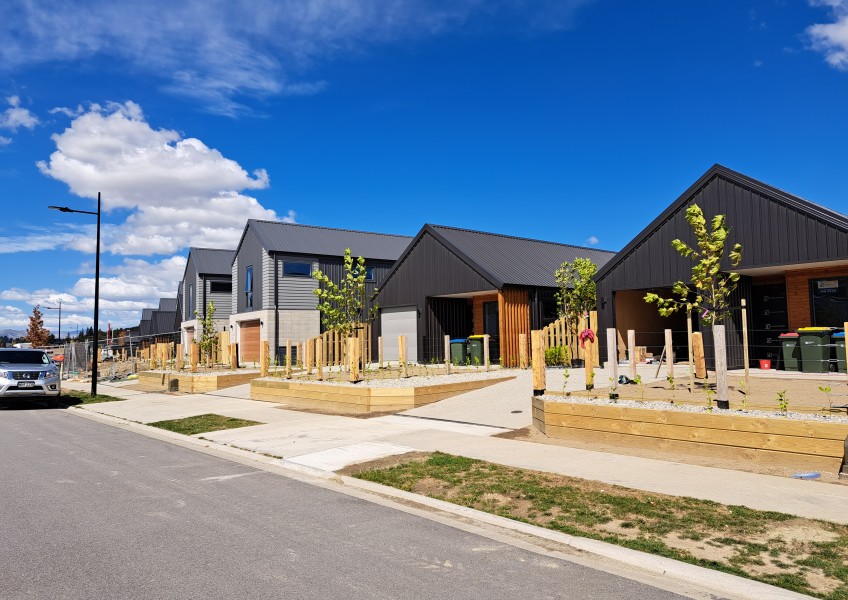'Groundbreaking' affordable housing plan on chopping block

A proposed policy to force property developers to support the provision of affordable housing in the Queenstown Lakes District is now on the chopping block.
An independent panel has recommended the Queenstown Lakes District Council withdraw its inclusionary housing variation after saying the council did not provide enough research or analysis to support the changes to the district plan.
A report with the recommendation will be in front of the council at a meeting on Thursday, and it will be up to councillors and the mayor to act on it.
Chief executive of the Queenstown Lakes Community Housing Trust Julie Scott says she is "deeply disappointed" with the panel's verdict.
"It goes without saying that this decision will have a significantly negative impact on low to moderate income residents of our district, and in turn on the community and the local economy."
Her organisation has 1,300 eligible households on its waiting list and she says the need for affordable, secure housing for workers, families and older members of the community has "never been greater".
In August 2022 the then-council voted to move forward with the variation to formalise inclusionary housing practices, working successfully on a case-by-case basis across the district since 2003.
Ms Scott says the success of the Queenstown Lakes Community Housing Trust has been built off the back of this inclusionary housing process.
"For over 21 years, developers have been sharing a small portion of the value uplift created through local and central government planning processes. These contributions have enabled the trust to provide affordable and secure tenure housing to hundreds of residents throughout our district."
It is her view formalising this process is the obvious next step.
"As a community, we need legislation within our toolbox, so we can continue to support the residents in our district who need affordable housing support.
"If councillors accept the recommendation to withdraw the recommendation, then the ball is essentially back in their court as how to the big question of 'where to from here?'."
The QLDC is the first council in New Zealand to have proposed inclusionary housing provisions for a district plan - Niamh Shaw, one of the councillors at the time who voted to notify the variation, called it "ground breaking".
The proposed variation would require most new residential subdivisions and developments to make a contribution of either land or money to the council, which would then shift the contributions on to the Queenstown Lakes Community Housing Trust - or another provider - to develop housing to assist low to moderate income earners.
However the independent hearing panel questions in its report whether there was enough evidence to show the proposed variation was the most effective tool for achieving this, suggesting instead that further research be done on a mix of other regulatory and non-regulatory options to address the housing affordability issue the district faces.
Specifically, the panel wants the council to delve deeper into:
- The options of providing generating funding through rates and development contributions
- Providing more affordable housing through plan provisions, like urban intensification, and partnering with other organisations, like central government
- The increase of residential visitor accommodation an dits impact on rental housing and, in turn, housing affordability
In a written statement today, QLDC's planning and development general manager Dave Wallace defends the work done by council staff.
"Staff and expert advisors developed a detailed case for the variation, on the basis that inclusionary housing rules could help deliver more affordable housing, in the same way developer agreements have been successfully used with specific developments since 2013,” Mr Wallace says in the statement.
“However, the independent hearing panel considered there was not enough research, analysis, and assessment of several alternatives that could be used to address housing affordability, meaning they could not make a recommendation in favour of the proposed inclusionary housing variation."
He says work is already in progress on most of the alternatives put forward by the panel, with options around plan provisions, partnerships, and Residential Visitor Accommodation all previously identified to support key actions of QLDC’s Joint Housing Action Plan and to improve housing outcomes in the district.
But it is his view their effects upon the district are not "fully understood yet".
The independent hearing panel, comprised of Jan Caunter, Jane Taylor, Ken Fletcher, and Dr Lee Beattie, heard submissions on the proposed variation in Queenstown in late February and March.
Read the report and recommendations of the independent commissioners at www.qldc.govt.nz/media/qeqbkcjm/4a-inclusionary-housing-variation-ihp-recommendation-report.pdf


























